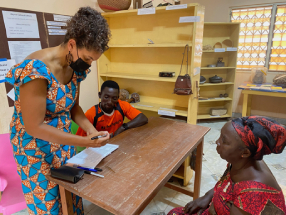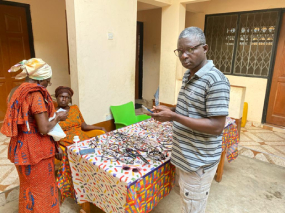Universal Holistic Healthcare 2023 Update
![]()
Listen to the Giving Back podcast
Universal Holistic Healthcare (UHH) is a 501c3, Missouri nonprofit, founded by Afua Bromley, MSOM, L.Ac., NCCAOM, in 2008, that works to promote integrative healthcare services to underserved and under-resourced communities both domestically in the United States and globally.

UHH has three primary objectives:
- To improve the quality of life through health for all people; particularly those who are in underserved, under-resourced or economically disadvantaged areas, through service and healthcare education.
- To provide affordable, holistic, high quality integrative healthcare including, but not limited to the modalities of acupuncture, herbology, bodywork, nutritional counseling, detoxification for substance abuse, and other indigenous methods of healing.
- To promote an international network of holistic health practitioners with a similar vision to create societies in which all people, regardless of ethnicity, economic status, geographic location, or religious affiliation, have access to quality, affordable healthcare.
Since 2008, UHH has had numerous projects in St. Louis, MO, some of which include an integrative HIV/AIDS clinic, low-cost acupuncture services through collaboration with health clinic for uninsured/underinsured, community education health workshops, and STI education/prevention. In 2023, UHH held health and chronic disease prevention workshops as part of the African Arts Festival and Operation Change St Louis and participated in community health podcasts in St Louis and Miami. UHH also served as mentor and fiscal sponsor for three small nonprofits whose missions are aligned with ours in eradicating health disparities – Black Acupuncturist Association, Black Healers Collective of St Louis and the Akoko Doula Project.
In Kukurantumi, Ghana, West Africa, UHH continued to work towards the construction of the Sankofa Integrative Medicine Clinic and Community Healthcare Worker Training Center along with numerous pop-up clinics. Though construction is temporarily on hold, The Training Center will help educate a cadre of community health workers holistically trained in health promotion and disease prevention (priorities around HIV/AIDS, COVID-19) and treatment of uncomplicated and non-severe illnesses, such as cases of malaria, diarrhea, mild pain management techniques, and malnutrition (particularly maternal and child nutrition) in the community.

In January 2023, UHH began our collaboration with Books for Africa Library project with a community health prevention workshop at BFA’s annual librarian in-service. These rural libraries will now serve as a health care base information hub around diabetes, hypertension and glaucoma – the top three ailments during UHH’s pop up clinics.
UHH is preparing for a Cervical Cancer Screening/prevention education/ and medical personnel training in 2024 at 3 sites in Ghana. UHH will partner with Project Give Hope to train physicians, nurse/nurse-midwives and other qualified health professionals to utilize thermal coagulators to treat women at high risk for cervical cancer, provide post-treatment care and education for medical and traditional herbalists. This project will provide 10 thermo-coagulators for shared medical use at three different urban and rural facilities in Ghana. Cervical Cancer is the leading cause of death from cancer in Ghanaian women. We hope to train at least 90 -120 medical practitioners and reach at least 500 people with our health prevention workshops. Our reach will exponentially grow through the involvement of the community health workers.
Due to the rising cost of construction, we have pivoted to creating a hybrid virtual education platform (rather than solely in-person training) targeting consumers and health practitioners (combination of free and low-cost training), and collaborating with local individuals/organizations to offer free or low cost services and herbal treatment while working on sustainability through training and supporting local practitioners. UHH strives to create models of affordable holistic, integrative healthcare that capitalize on local resources (people and herbal medicines) and can be easily culturally adapted for any community.
If you are interested in learning more or finding out how you can support us or to sign up for our quarterly newsletter, please visit www.universalholistichealth.org.

